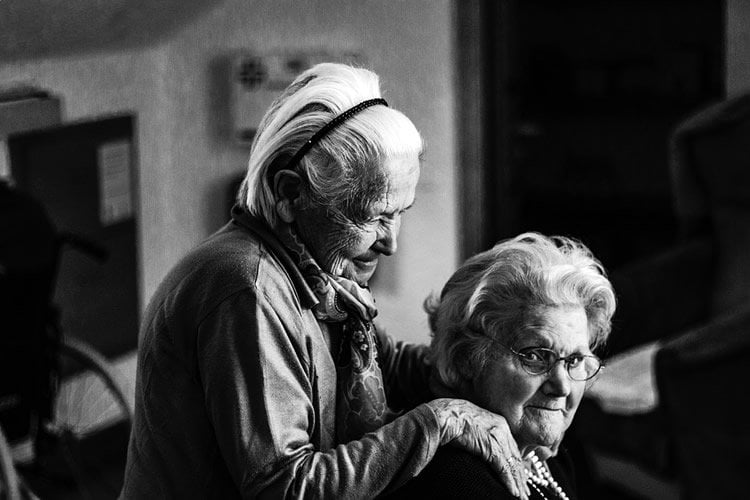Summary: A new PLOS ONE study reports superagers who maintain positive friendships have better cognitive ability and slower memory decline that peers who do not maintain strong social networks.
Source: Northwestern University.
Maintaining positive, warm and trusting friendships might be the key to a slower decline in memory and cognitive functioning, according to a new Northwestern Medicine study.
SuperAgers — who are 80 years of age and older who have cognitive ability at least as good as people in their 50s or 60s — reported having more satisfying, high-quality relationships compared to their cognitively average, same-age peers, the study reports.
Previous SuperAger research at the Cognitive Neurology and Alzheimer’s Disease Center (CNADC) at Northwestern University Feinberg School of Medicine has focused on the biological differences in SuperAgers, such as discovering that the cortex in their brain is actually larger than their cognitively average, same-age peers. This study, published Oct. 23 in the journal PLOS ONE, was the first to examine the social side of SuperAgers.
“You don’t have the be the life of the party, but this study supports the theory that maintaining strong social networks seems to be linked to slower cognitive decline,” said senior author Emily Rogalski, associate professor at Northwestern’s CNADC.
Participants answered a 42-item questionnaire called the Ryff Psychological Well-Being Scale, which is a widely used measure of psychological well-being. The scale examines six aspects of psychological well-being: autonomy, positive relations with others, environmental mastery, personal growth, purpose in life and self-acceptance. SuperAgers scored a median overall score of 40 in positive relations with others while the control group scored 36 — a significant difference, Rogalski said.

“This finding is particularly exciting as a step toward understanding what factors underlie the preservation of cognitive ability in advanced age, particularly those that may be modifiable,” said first author Amanda Cook, a clinical neuropsychology doctoral student in the laboratory of Rogalski and Sandra Weintraub.
Other research studies have reported a decline in social networks in people with Alzheimer’s disease and Mild Cognitive Impairment (MCI), and previous literature has shown psychological well-being in older age to be associated with reduced risk of developing Alzheimer’s dementia.
“It’s not as simple as saying if you have a strong social network, you’ll never get Alzheimer’s disease,” Rogalski said. “But if there is a list of healthy choices one can make, such as eating a certain diet and not smoking, maintaining strong social networks may be an important one on that list. None of these things by themself guarantees you don’t get the disease, but they may still have health benefits.”
Other Northwestern authors on the study include Stephanie Kielb, Emmaleigh Loyer, Maureen Connelley, Alfred Rademaker, Dr. M.-Marsel Mesulam, Sandra Weintraub, Dan McAdams and Regina Logan.
Funding: The research was funded by grants from the National Institutes of Health, including R01 AG045571 and P30 AG13854 from the National Institute on Aging, T32 NS047987 from the National Institute of Neurological Disorders and Stroke as well as the Davee Foundation and the Foley Family Foundation.
Source: Kristin Samuelson – Northwestern University
Publisher: Organized by NeuroscienceNews.com.
Image Source: NeuroscienceNews.com image is in the public domain.
Original Research: Full open access research for “Psychological well-being in elderly adults with extraordinary episodic memory” by Amanda Cook Maher, Stephanie Kielb, Emmaleigh Loyer, Maureen Connelley, Alfred Rademaker, M.-Marsel Mesulam, Sandra Weintraub, Dan McAdams, Regina Logan, Emily Rogalski in PLOS ONE. Published online October 23 2017 doi:10.1371/journal.pone.0186413
[cbtabs][cbtab title=”MLA”]Northwestern University “Close Friends Linked to a Sharper Memory.” NeuroscienceNews. NeuroscienceNews, 2 November 2017.
<https://neurosciencenews.com/memory-friendship-7852/>.[/cbtab][cbtab title=”APA”]Northwestern University (2017, November 2). Close Friends Linked to a Sharper Memory. NeuroscienceNews. Retrieved November 2, 2017 from https://neurosciencenews.com/memory-friendship-7852/[/cbtab][cbtab title=”Chicago”]Northwestern University “Close Friends Linked to a Sharper Memory.” https://neurosciencenews.com/memory-friendship-7852/ (accessed November 2, 2017).[/cbtab][/cbtabs]
Abstract
Psychological well-being in elderly adults with extraordinary episodic memory
Objectives
The Northwestern University SuperAging Program studies a rare cohort of individuals over age 80 with episodic memory ability at least as good as middle-age adults to determine what factors contribute to their elite memory performance. As psychological well-being is positively correlated with cognitive performance in older adults, the present study examined whether aspects of psychological well-being distinguish cognitive SuperAgers from their cognitively average-for-age, same-age peers.
Method
Thirty-one SuperAgers and 19 cognitively average-for-age peers completed the Ryff 42-item Psychological Well-Being questionnaire, comprised of 6 subscales: Autonomy, Positive Relations with Others, Environmental Mastery, Personal Growth, Purpose in Life, and Self-Acceptance.
Results
The groups did not differ on demographic factors, including estimated premorbid intelligence. Consistent with inclusion criteria, SuperAgers had better episodic memory scores. Compared to cognitively average-for-age peers, SuperAgers endorsed greater levels of Positive Relations with Others. The groups did not differ on other PWB-42 subscales.
Discussion
While SuperAgers and their cognitively average-for-age peers reported similarly high levels of psychological well-being across multiple dimensions, SuperAgers endorsed greater levels of positive social relationships. This psychological feature could conceivably have a biological relationship to the greater thickness of the anterior cingulate gyrus and higher density of von Economo neurons previously reported in SuperAgers.
“Psychological well-being in elderly adults with extraordinary episodic memory” by Amanda Cook Maher, Stephanie Kielb, Emmaleigh Loyer, Maureen Connelley, Alfred Rademaker, M.-Marsel Mesulam, Sandra Weintraub, Dan McAdams, Regina Logan, Emily Rogalski in PLOS ONE. Published online October 23 2017 doi:10.1371/journal.pone.0186413






